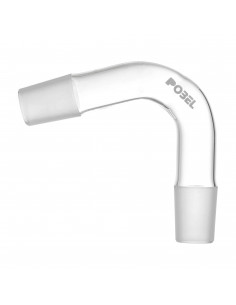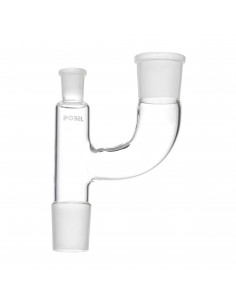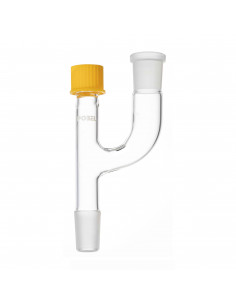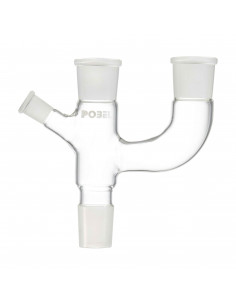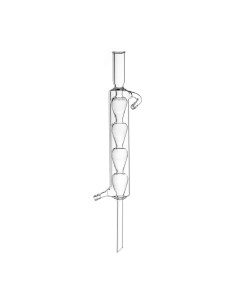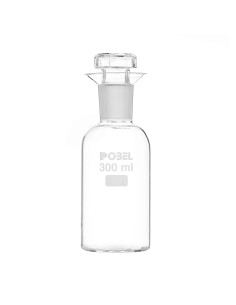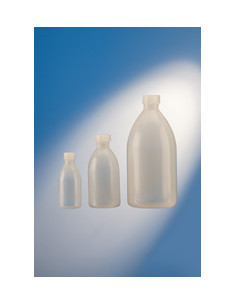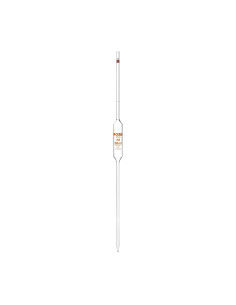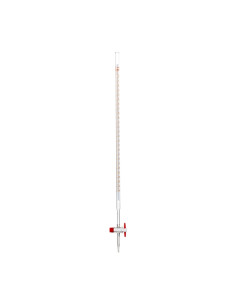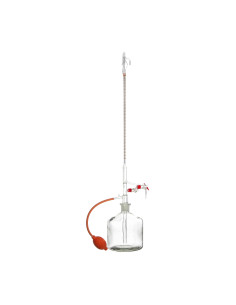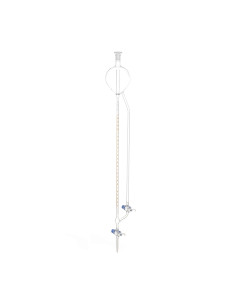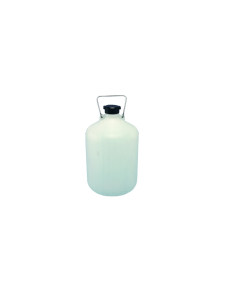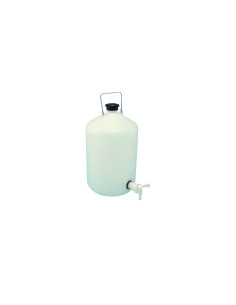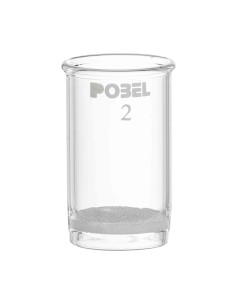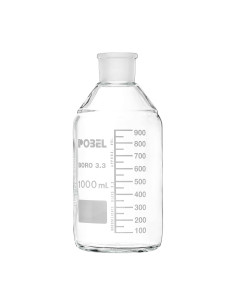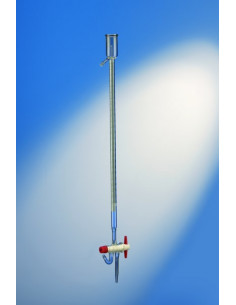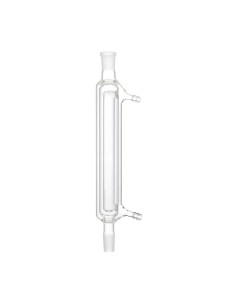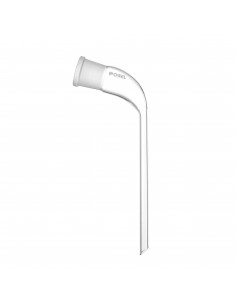MATERIAL DE LABORATORIO DE VIDRIO
ADAPTER ACC. TO CLAISEN, 3 WAYS, W/THERMOMETER INLET
BULB PIPETTES, 1 MARK, CLASS A
BULB PIPETTES, 2 MARKS, CLASS A
Laboratory Glassware
At Pobel, you will find a wide range of laboratory glassware designed to ensure precision, durability, and reliability in all types of scientific procedures. Our selection includes high-quality borosilicate glass labware, ideal for analytical work, synthesis, heating, storage, or measurement of substances.
We offer items tailored for chemistry, biology, microbiology, quality control, education, and industrial sectors that require certified, long-lasting laboratory glassware.
High-Resistance Laboratory Glassware
Lab glassware must withstand demanding conditions: high temperatures, contact with aggressive chemicals, sudden thermal changes, and frequent use. That’s why we carefully select products that offer:
-
Borosilicate glass: resistant to thermal shock and chemical attack
-
Standardized designs: compatible with laboratory equipment and accessories
-
Clear graduations and precise finishes: for accurate measurements
-
Easy cleaning and sterilization: suitable for autoclave or traditional methods
What Types of Laboratory Glassware Can You Find at Pobel?
In our various product categories, you'll find an extensive selection of borosilicate glass items, designed to meet the full range of scientific and educational needs. Some of the featured products include:
-
Beakers (Griffin and Berzelius types): available in different capacities and heights, ideal for heating, stirring, or preparing solutions safely
-
Graduated cylinders: made from high-strength transparent glass for accurate liquid volume measurements in milliliters
-
Test tubes and centrifuge tubes, as well as all types of lab tubes: with round or conical bottoms, in graduated or ungraduated versions, and with or without screw caps
Flasks:
These are essential for preparing solutions, digestions, and controlled chemical reactions.
Specialized Glassware:
-
Schlenk tubes for inert atmosphere work
-
Desiccators with ground-glass lids or vacuum design
-
Reflux condensers, straight or Dimroth-type
-
Chromatography columns
Essential Accessories:
-
Glass funnels (Hirsch or Büchner types)
-
Stirring rods in various lengths
-
Flat-bottom crystallizers
-
Ground-glass stoppers and standard-joint fittings: ideal for vacuum setups, air-free reactions, or safe glass-to-glass connections
And much more. Discover the entire glassware range in our online store and equip your lab with high-quality, durable products tailored to your processes.
Why Choose Laboratory Glassware from Pobel?
At Pobel, we specialize in high-quality lab glassware and offer far more than just a product catalog. Here’s why professionals trust us:
✔️ Extensive and Specialized Catalog:
One of the most comprehensive ranges of lab glassware, including beakers, flasks, tubes, burettes, pipettes, micropipettes, cylinders, condensers, columns, funnels, and standardized joint accessories. From basic to highly technical applications in advanced environments.
✔️ Guaranteed Quality:
All items are made from borosilicate glass with high thermal and chemical resistance, and come with certifications to ensure their professional use in demanding labs. We follow international quality standards.
✔️ Compatibility and Precision:
Our products are designed to easily integrate with vacuum systems, Schlenk lines, and distillation or chromatography setups. Many items include standard ground joints, ideal for secure, leak-free assemblies.
✔️ Personalized Technical Advice:
If you're unsure which type of tube, flask, or funnel you need, our team will help you select the right product for your specific application—whether it’s clinical analysis, chemical synthesis, teaching, or industrial work.
✔️ Trusted by the Scientific and Technical Sector:
For years, Pobel has supplied labware to universities, hospitals, research centers, private clinics, and major chemical and pharmaceutical industries. Our experience ensures reliable, fast service tailored to each customer.
Applications of Laboratory Glassware
Pobel’s laboratory glassware is designed to provide maximum reliability across a wide range of professional settings. Its chemical resistance, volumetric precision, and adaptability make it indispensable in the following contexts:
Educational Laboratories
Training centers in chemistry, biology, or environmental sciences regularly use beakers, test tubes, and Erlenmeyer flasks for safe, hands-on practices. These materials help students understand concepts like dissolution, filtration, and distillation.
Clinical and Hospital Laboratories
Volumetric flasks, centrifuge tubes, and crystallizers are used for analyzing urine, blood, or buffer solutions. The glass's transparency and durability allow precise observation without interference.
Scientific Research Labs
In organic and inorganic chemistry, biochemistry, or nanotechnology, researchers use specialized glassware—like condensers, columns, desiccators, and Schlenk tubes—for synthesis, purification, and inert-atmosphere reactions.
Pharmaceutical, Chemical, and Food Industries
For quality control and product development, graduated cylinders, Kjeldahl flasks, separating funnels, and stirring rods are commonly used. These tools help ensure product consistency, purity, and safety prior to distribution.
Environmental and Agro-industrial Labs
Glassware is essential for measuring the physicochemical parameters of soil, water, or food, using instruments such as pycnometers, burettes, and reaction tubes.
And many more uses.
Tips for the Use and Maintenance of Lab Glassware
Proper care of laboratory glassware is essential to ensure safety, precision, and longevity. Here are key recommendations:
-
Proper storage: Use racks, protected shelves, and dry zones to prolong service life and prevent accidents
-
Inspect before each use: Check for cracks, chips, or deformities. Damaged glassware can break during heating or when under pressure
-
Immediate cleaning after use: Use lab-grade detergents and glass brushes. Removing residues prevents cross-contamination that could affect future analyses or reactions
-
Choose the right glass for each heat source:
-
For direct flame heating, use borosilicate beakers or flasks
-
For water baths or hot plates, use flat-bottomed vessels for better stability
-
-
Avoid thermal shock: Never place hot glassware on cold surfaces or cool it under running water—this stress can cause microfractures or breakage
-
Sterilize appropriately: If protocols require, use an autoclave, dry heat oven, or disinfectant solutions, depending on the glass type and intended use. Ensure stoppers, joints, and parts are compatible with the chosen method
Buy Your Laboratory Glassware from Pobel
Browse our categories and find everything you need to work with confidence and precision. Our glassware is built to last, offer accurate measurements, and adapt to the most rigorous scientific methods.
Contact us for quotes or expert assistance for your laboratory.




